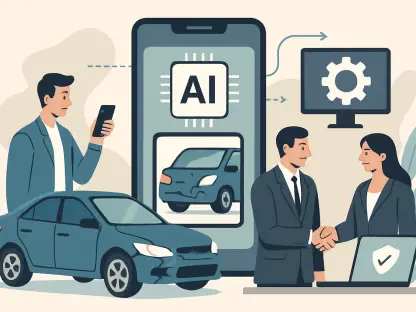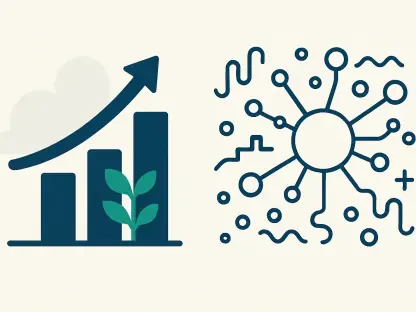As we advance further into a tech-driven era, the insurance industry finds itself at a critical juncture where traditional practices must evolve to meet modern demands. Technological innovations, particularly the rise of artificial intelligence, have redefined business landscapes, presenting both challenges and opportunities for insurance agents. Facing pressures from carriers adopting cutting-edge technologies and clients expecting seamless digital interactions, the insurance sector is undergoing profound transformations. Agents stand at the crossroads of this rapidly evolving environment, tasked with redefining their roles to maintain relevance and add value to the insurance process beyond traditional means.
Embracing Technological Advancements
The Shift from Manual to Digital Processes
The industry’s shift from manual processes to digital systems marks a significant transition, reflecting a broader trend towards operational efficiency. Traditional tasks, like assembling policy documents, which once required manual handling in regional offices, no longer define the contributions of insurance agents. This shift compels agents to reconsider their roles, moving toward digital tools that streamline operations and enhance client interactions. As carriers increasingly adopt digital platforms, the onus is on agents to align with these advancements, leveraging them to reclaim time once spent on administrative tasks.
Digital platforms offer agents the opportunity to offload routine tasks, redirecting efforts toward more value-added services such as advisory roles in risk management and coverage planning. Providing personalized, strategic guidance not only increases customer satisfaction but also enhances the agent’s role as a trusted advisor. In a landscape where efficiency is paramount, agents can utilize technological tools to better understand client needs and deliver tailored solutions, thus elevating their service offerings. Successful agents integrate technology into their workflows, using it to augment rather than replace their professional expertise.
Understanding Client Expectations
While technology presents opportunities to streamline processes, it also comes with the challenge of meeting heightened client expectations for seamless and swift digital interactions. Clients now expect the same level of user experience they encounter with other digital services, demanding transparency, ease of communication, and instant policy updates. For insurance agents, this means rethinking their approach to customer interaction, using digital tools to enhance, rather than disrupt, the client experience. Agents must understand and anticipate client needs, ensuring all digital interfaces are intuitive and user-friendly.
Clients respond positively to personalized, efficient service, appreciating agents who provide timely updates and clear communication. Through digital platforms that facilitate immediate interaction and real-time information sharing, agents can remain engaged with clients throughout the policy lifecycle. This approach not only builds stronger client relationships but also allows agents to stay at the forefront of service delivery in a competitive market. By embracing these tools, agents reaffirm their commitment to client-centric service, crucial for maintaining and growing their client base in a digital age.
Bridging the Industry Gaps
Overcoming Disconnects in Client-Carrier Dynamics
The transition toward digital platforms surfaces underlying disconnects between insurance carriers and agents. Many in the industry lack firsthand experience operating as agents, leading to a misalignment in understanding the customer journey from initial contact to the finalized policy. This misalignment creates friction in service delivery, affecting both the efficiency of operations and client satisfaction. To bridge this gap, carriers need to provide transparent communication and support as agents transition toward digital integration.
Carriers can facilitate this process by openly sharing their technological capabilities, ensuring agent buy-in and alignment. Maintaining open channels of communication not only enhances the overall service model but also fosters a collaborative environment where carriers and agents jointly advance industry standards. By engaging with agency councils and incorporating agent feedback, carriers ensure that the digital transition supports rather than stifles traditional service values. This collaborative approach fosters synergy, essential for cultivating a thriving, modern insurance landscape responsive to technological and client-driven demands.
Refining Value Propositions
In reframing their value propositions, insurance agents must shift focus from purely transactional roles to becoming trusted advisors offering expert guidance on complex risk scenarios. This transition involves embracing a proactive strategy in proactive insurance planning and consultation, areas where human insight far exceeds the capabilities of machines. By gaining a deeper understanding of nuanced coverage and complex risk scenarios, agents secure their relevance as indispensable partners in the insurance process.
However, this shift comes with its own set of challenges. Agents must continuously educate themselves on emerging risks and evolving insurance landscapes to provide informed guidance. Leveraging digital tools to manage routine tasks allows for increased focus on more intricate risk assessments and strategic planning. Fostering a deep understanding of client-specific needs is crucial, enabling agents to offer tailored advice and forge robust relationships that withstand the digital industry’s vicissitudes. As the industry evolves, agents who pivot toward these roles emerge as vital players, demonstrating the indispensable value of human intellect in a technology-centric world.
Mastering the Balance of Tech and Human Touch
Harnessing Automation and Personal Expertise
Navigating the intersection between automation and personal expertise is paramount for agents seeking sustainable success. The ideal strategy lies not in mastering every technological platform but in discerning the value-added tasks suited for human intervention versus those primed for automation. The delineation between these roles allows agents to maintain scalability without compromising on personalized service, a hallmark of successful agencies.
With routine processes such as quoting and documentation efficiently managed by automated systems, agents can dedicate more time to complex cases requiring nuanced human understanding. This strategic bifurcation enables agents to address high-value accounts and build stronger client relationships, ultimately securing their competitive edge in a saturated market. By leveraging both automation and personal expertise, agents foster a balanced approach, crucial for navigating the challenges and seizing the opportunities presented by rapid technological advancements.
Looking Forward to Industry Growth
As we advance further into a tech-driven era, the insurance industry finds itself at a pivotal point where traditional practices must evolve to align with contemporary demands. The advent of technological innovations, particularly the rise of artificial intelligence, has transformed business landscapes, offering both challenges and opportunities for insurance agents. Carriers are rapidly adopting advanced technologies, while clients increasingly expect smooth digital interactions. This dual pressure forces the insurance sector to undergo significant transformations. Insurance agents now stand at the intersection of this swift evolution, compelled to redefine their roles to stay relevant. They must provide added value to the insurance process, extending beyond traditional methods. Embracing technology can lead to enhanced efficiency, better customer interactions, and more tailored insurance solutions. Successfully navigating this new landscape requires a balance of adopting innovations and maintaining the personal touch that builds trust with clients.









